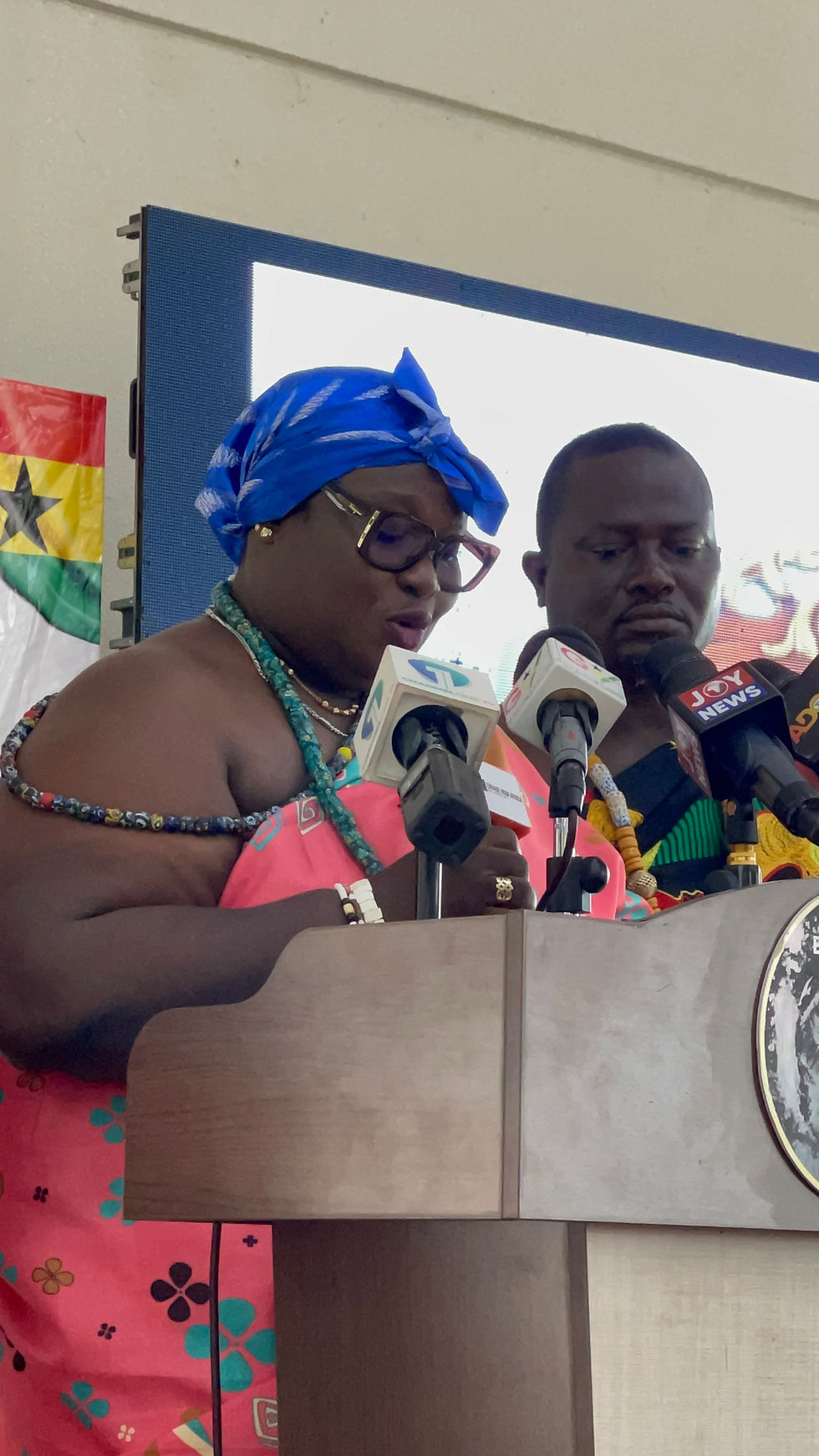“Literacy is dignity, opportunity, identity, and freedom” — Ga Mantse
- Think News Online

- Sep 8
- 4 min read

His Royal Majesty, King Tackie Teiko Tsuru II, Ga Mantse, has underscored the transformative power of literacy, describing it as “dignity, opportunity, identity, and freedom.”
The Ga Mantse made this declaration in a speech delivered on his behalf by Naa Ameley Tessaa I, Teiko Tsuru We Mannye, at the International Literacy Day celebration organized by Engage Now Africa in Accra.

The event was held under the global theme: “Promoting Literacy in the Digital Era.”
Tracing the history of International Literacy Day, which was first observed in 1967, the Ga Mantse highlighted that literacy today extends beyond reading and writing to include digital competence, warning against what UNESCO terms “double marginalisation” — where those without literacy are excluded both from traditional learning and the digital age.

“In our Ga communities, and across Ghana, literacy is not just letters on a page. It is how we pass on our history, preserve our traditions, and safeguard our identity”
“When we lose literacy, we lose memory. When we strengthen it, we empower the next generation to compete in the wider world,” he emphasized.
The Ga Mantse called on parents, teachers, leaders, and traditional authorities to embrace technology not as a threat, but as a bridge connecting Ghana’s cultural heritage to future opportunities.

He commended learners for their courage, volunteers for their dedication, and Engage Now Africa for its commitment to empowering communities through education.
On her part, Country/Africa Director of Engage Now Africa, Cecilia Amankwaah stressed that literacy remains the prerequisite for fully benefiting from the opportunities of the digital era.
“Presently, the world is invaded and led by digital tools… However, the springboard and prerequisite for effectively and efficiently participating in and benefiting fully from the resources of the digital age is literacy,” she said.

Ms. Amankwaah noted that despite Ghana’s literacy rate of 69.8 percent, many citizens are still excluded from the digital space due to limited literacy skills, poor internet access, and socioeconomic barriers.
She referenced the disruptions caused by the COVID-19 pandemic as evidence of the urgent need to equip all citizens with literacy and digital skills to withstand future challenges.

Citing global statistics, she revealed that while 93 percent of people in high-income countries used the internet in 2024, only 27 percent did so in low-income countries, underscoring the importance of connectivity in advancing basic literacy.
Highlighting Engage Now Africa’s impact, Ms. Amankwaah reported that the organization has enrolled over 20,000 learners in its literacy programs, graduated approximately 15,000, and provided skills training to more than 10,000 citizens across Ghana.

She assured that the NGO is committed to partnering with government and like-minded organizations to scale up interventions, particularly for vulnerable, marginalized, and disadvantaged groups.
“We are prepared to collaborate with other NGOs and the Government to bring about the transformative change we all desire,” she affirmed.
She expressed appreciation to the Church of Jesus Christ of Latter-day Saints for its funding support and to UNESCO for recognizing Engage Now Africa as one of Ghana’s leading literacy providers, granting it a place at the GRALE-6 capacity-building workshop in Morocco.

Speaking on behalf of the Secretary-General of the Ghana Commission for UNESCO, Dr. Osman Tahidu Damba; Principal Program Officer for Education at the Ghana Commission for UNESCO, Moses Gemeh hinted that literacy in today’s world must extend beyond the ability to read and write, to include digital fluency, critical thinking, and responsible use of technology.
“Digitalization has created new pathways for literacy. With a smartphone, a child in Bawku can access educational materials available to a child in Accra”
“A farmer in Ejura can receive extension information in his local language, and a young entrepreneur in Hohoe can learn financial literacy through mobile applications,” Dr. Damba noted.

“Yet, the risks are equally clear. Without deliberate action, the digital divide will deepen inequality and leave many behind.”
He cited challenges such as poor internet connectivity in rural schools, high data costs, and limited digital literacy among some teachers and learners.
“As we look ahead, emerging technologies like artificial intelligence and automation will reshape work and life. Many jobs our young people aspire to today will no longer exist tomorrow. Literacy must therefore prepare them not just as consumers of technology, but as creators and innovators,” he said.

— NyɛAwo Naa Ayele Nɔbaatsɛ I, Ga Paramount Queen for Youth and Children urged Ghana to confront the harsh realities of its struggling education system, warning that without urgent reforms, the country risks being left behind in the digital age.
She stressed that literacy today must go beyond the ability to read and write, to include skills in digital navigation, critical thinking, distinguishing truth from falsehood, and responsible citizenship.
“Ghana has made numerous attempts to improve education through resource allocation and system planning, even in its analog mode. Yet the results are nothing close to the basics required, and that remains deeply disappointing,” she said.
The Queen Mother referenced a 2022 Business & Financial Times Eduwatch report, which revealed that over 1.2 million Ghanaian children were still out of school, 17 years after the introduction of Free Compulsory Universal Basic Education (FCUBE).

The report further highlighted chronic problems such as underfunded schools, shortages of books and learning materials, overcrowded classrooms, too few teachers, and the hiring of untrained personnel to fill teaching gaps.
“These reports are the constant in our school system. One is therefore tempted to ask: why? Until we answer this question, we cannot find a functional and sustainable pathway into the digital era,” Naa Ayele Nɔbaatsɛ I noted.

The celebration, attended by education stakeholders, learners, and community leaders, marked the 58th edition of International Literacy Day.
Story by: Joshua Kwabena Smith








Comments